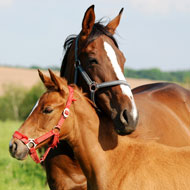New Equine Virus test launched

NEV is often misdiagnosed or hidden by other diseases that cause similar symptoms.
The first commercial diagnostic test for New Equine Virus (NEV) has been launched.
First discovered in 2013, NEV is often misdiagnosed or hidden by other diseases that cause similar symptoms, such as anaemia and neurological problems.
It is most often confused with the Swamp Fever virus (EIAV) and Equine Herpesvirus (EHV).
Now, thanks to research by equine biotech firm Equigerminal, vets, laboratories and horse owners will be able to identify this often fatal disease and administer the appropriate treatment.
The test requires a vet to take a blood sample from the horse and send it to the Equigerminal lab. The blood is then analysed and the results are returned to the owner or vet.
When the results are returned, the horse can be given treatment and the spread of the disease can be prevented. Currently, treatment is aimed towards improving the general wellbeing of the horse, monitoring its health and boosting the immune system.
NEV was discovered by Portuguese scientist and veterinary surgeon Isabel Fidalgo Carvalho while completing her PhD in Equine Sciences at the Universities of Oporto and Pittsburgh.
“During my time at University and at Equigerminal, I noticed unusual anaemia and severe neurological signs in horses, which in my PhD I wrongly hypothesized to be attributed to Swamp Fever,” she said. “I then realised, through the samples, that this virus was actually closer to equine HIV – New Equine Virus, or NEV”.
After her discovery, Carvalho launched Equigerminal with fellow scientist Alexandre Vieira Pires.
“We have spent the last five years developing a diagnostic test and a potential cure for NEV.” explains Pires.“We now need to raise awareness of the problem and help vets to diagnose this disease correctly.”



 The Federation of Independent Veterinary Practices (FIVP) has announced a third season of its podcast, Practice Matters.
The Federation of Independent Veterinary Practices (FIVP) has announced a third season of its podcast, Practice Matters.